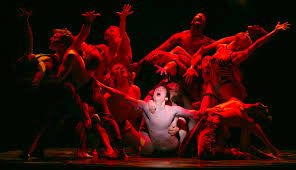
By Alexis Yoo

“Pippin” (2013) is a fun, glamorous performance that perfectly blends the right amount of magic, musical numbers and magnificently flashy clothing. However, the best part of the show is how all of these things are just “fluff” – layers on top of a deep, darker foundation which you can only get to by peeling the fluff off, and seeing the real intent naked and bare in front of you. Figuratively and literally – you’ll understand what I mean once you watch the show. Indirectly focusing on themes such as suicide, temptation and the global epidemic of boredom with life, the play wonderfully hides its intent behind its generally hyper energy. “Pippin” is an entertaining circus performance and Broadway show in one.
Many scenes left me bedazzled and bewildered by the side effects and how they were accomplishing these enchanting acts. Acrobats add to the charm by constantly swinging in the air and dangling from aerial hoops, gracefully and skillfully.
Pippin (Matthew Thomas), the lead, spends his whole life aiming to be extraordinary, for his life to be extraordinary, and to achieve extraordinary things. Pippin is continually left unsatisfied with all the events that occur in his life, and constantly chases “something more” (as if being the son of a king, falling in love and going to war aren’t enough.). Ironically, he is also the only character dressed in an extraordinarily ordinary fashion, and he parades around in a simple gray tee. This is definitely intentional, and other hidden symbols can be found throughout the show.
And that’s what makes “Pippin” even more intriguing: the purpose behind the glitz and glam of the bright rainbow colored stage lights and petty (yet sometimes comedic) conflicts. The bigger issue is more openly displayed at the end when the leading player (Patina Miller) shows her true colors in a fit of rage and…I won’t spoil anything more.
And for any of you who know some Pippin history, yes, the leading player is played by a woman in this one. Usually the role of a male, Miller nails the part and embodies a character that is aggressive, loud-voiced and a bit suspicious to their full essence. The leading player was confusing at first – I was constantly thinking, “who is that character exactly? A cousin…? A mentor…? An assistant…?” It was exciting to find out that she is the voice in Pippin’s head - the demon luring him to do things that will harm him. Someone we all have inside ourselves.
Reinventing an old show is very risky especially due to the high standards already pre-set. But after 40 years, the wonderful story is back again and definitely worth the trip to go see.